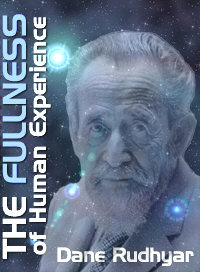 |
| Home | Bio | Art | Music | Literature | Civilization & Culture | Philosophy of Wholeness | Theosophy & Spirituality | Astrology |

CHAPTER SEVEN
A New Frame of Reference: The Earth-being & the Function of Humanity within It - 4 C: The Earth-being as all-inclusive planetary frame of reference When speaking of the Earth-being I do not mean a globe of dense matter, or a vast organism animated by the life-force, or an immensely powerful and perfect person, or the universal God of the great religion) reduced to a terrestrial size. The Earth-being is all these concretely experienceable factors in a total, all-inclusive planetary situation in which the whole of mankind participates. It participates in it, and therefore is able to affect it. The Earth-being is an immense field of activity and consciousness organized at several levels. All human beings operate at some of these levels. The important fact today is that if the meaning and purpose of these operations are understood in relation to the Earth-being as a frame of reference, they may acquire a new quality. Mankind has now to understand what this quality is in a realistic sense, and to accept it consciously, not only as an intellectual or "psychological" interpretation (which may turn out to be an evasion) but as the product of a workable relationship with a concrete Being. The formulation of what is implied in this understanding nevertheless poses difficult problems. The realization that a workable relationship with the Earth-being can operate at several levels, all of which are "real" yet of limited scope, is an essential factor in the human situation as it has developed during many millenia of history and prehistory. No level of activity can be omitted or bypassed. "Man" as measurer and mathematician has an essential function in the earth-field. He constitutes a level of activity not only in, but of, the Earth-being. How he uses that function and to what purpose are the crucial questions. The individual and collective interpretation given to personhood in relation to the karma of ancient failures, and the way in which consciousness and human desires approach or respond to the idea of a Supreme Person, are basic issues. The Supreme Person and the avataric beings who are the sources of the various cultures, may be considered incarnations of an essentially transcendent God external to the universe He created, or (when the time comes for the potentially transformative activity) component factors in the evolutionary reality of the Earth-being. Their Presence in the whole planetary field is not only an "ideal" interpreted by various religious systems, but a catalytic (or "in-spiriting") reality — an element necessary to the evolution of mankind. This evolution takes place within the all-inclusive field of the Earth-being's activity and consciousness. Everything human, as well as sub- and super-human, should be referred to this planetary field of being. But this field is not an abstract, mathematically and quantitatively formulatable frame of reference. It is a concrete, multilevel reality to which equally concrete and multilevel human individuals can totally relate. The relation is material and molecular, biological in a functional way, personal in an ecological-cultural sense, then gradually more and more specialized and individualized. After a drastic period of reorganization and transmutation of personal desires, the relation may take on a super-personal or transpersonal character in terms of participation in the unified activity and unanimous consciousness of the planetary Pleroma. This participation can be, and in time should become effective in a concrete and realistic sense, if the beingness of the planetary Being is totally accepted as a "truth" whose self-evidence has become increasingly objective and unchallengeable. It can be as unchallengeable as a causally linked series of mathematical propositions, but in terms of another quality of conscious response to a situation. The basic issue is what meaning is given to the word reality. There is material reality in the explosion produced by the coming together of certain kinds of molecules. There is biological reality in the nearly uncontrollable mating of a stallion and a mare, or in the illness resulting from the spilling on one's body of a test-tube filled with active viruses. There is reality in a personal initiative, which nets social success, fame, or wealth. But we should not limit reality to this personal, sociocultural, and financial level of power. Our total being may be involved in another kind of reality — one which we not only have to interpret intellectually, but to which we should respond at a level of beingness transcending matter, life, culture, personhood, and even a seemingly incontrovertible feeling-experience of separate individuality. If we are fully to understand and attribute "reality" to such feeling-experience, it has to be given a thoroughly consistent frame of reference. A mathematical frame of reference may be assumed to be universal because, being abstract, it is not conditioned by and attached to any particular experience, but the possibility of any formulation being "universal" in such a mathematical sense is a highly questionable assumption. This kind of assumption may change. The universality of Euclid's geometry was declared invalid by non-Euclidean geometry. A pantheistic God could be considered universal, because He-It would be not only a creative but also a maintaining factor present in some incomprehensible manner in every mode of being. Nevertheless, the belief that a merely human individual is able really to experience, and indeed hold a dialogue with such a God, implies a situation actually beyond imagining. It would require the interaction not only of a human mind but of a whole human field of biological and sociocultural activity, with a supreme Universal Being whose beingness extends over billions of light-years as well as structures the infinitesimal period of billionths of seconds. The possibility of such a situation is actually inconceivable, except through the use of symbols (words or algebraic equations) which can be played with but not experienced. Yet such situations apparently occur and produce realistic changes. If they do, can it not be that they are given a confusing and erroneous interpretation by the sociocultural mind, and that what is believed to be "universal," because expressed in abstract and formalistic terms, is in fact only planetary? The God of the universalistic religions, and the universal "laws" of mathematically formulated science, may be realities experienceable at the human stage of culture on this or any dense planet. They may be "true" in relation to Man and to the field this Man-stage of the Movement of Wholeness is able to encompass, and from which it may extract meaning. The universal constants measured by modern science may indeed be fully reliable values "in the neighborhood of" the present level of the human space of existence which conditions the structures and boundaries of the human mind. But assuming that they are universally true may indeed be unjustifiable and a form of generic pride. When able to operate at the level of abstractions opened up through the practice of measurements and the intellectual correlation of rational thinking, the human mind can assuredly have remarkable realizations of what it perceives as universal order. The scientist speaks of "elegant solutions" to mathematical problems, just as the artist enjoys the "beauty" of natural or manmade forms, and the moralist is inspired by the "good" embodied in the fabric of some interpersonal relationships. Greek culture left us the trinity of the Good, the True, and the Beautiful as a potent legacy. But each culture has its own definition of these ideals, even if one may discover beyond the differentiated interpretations and realizations a general set of "perennial" principles which seem to be valid everywhere and at all times. What is really meant by "everywhere and at all times" are the evolutionary phases of the Movement of Wholeness after the symbolic Noon. These phases refer to the development of personhood and culture, which in turn constitute only a particular level of the total field of activity and consciousness of the Earth-being. As previously stated, the function humanity has to perform at the level where specifically human situations arise may be significantly interpreted in terms of the neutralization or absorption of the karma of past failures. Such a function, however, has an ambivalent potential; it inevitably includes the possibility of new failures as the result of the "freedom" inherent in human situations. Where and when there is "success," new and more-than-human situations take form as the power of the principle of Unity increases within the field of the Earth-being. Then the development of the planetary Pleroma gradually takes place. This development may become clearer if we use as an intellectual tool the concept of planetary spheres — even if today its use is limited to a difference in material conditions. By permission of Leyla Rudhyar Hill Copyright © 1986 by Leyla Rudhyar Hill All Rights Reserved.  Web design and all data, text and graphics appearing on this site are protected by US and International Copyright and are not to be reproduced, distributed, circulated, offered for sale, or given away, in any form, by any means, electronic or conventional. See Notices for full copyright statement and conditions of use. Web design copyright © 2000-2004 by Michael R. Meyer. All Rights Reserved. |
 |
